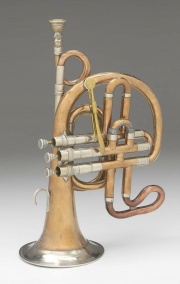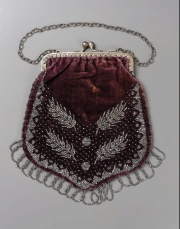Difference between revisions of "German silver"
(username removed) |
|||
| Line 2: | Line 2: | ||
== Description == | == Description == | ||
| − | An old name for [ | + | An old name for [[nickel silver]]. Nickel silver is a silvery white alloy composed of [[copper]] (52-80%), [[zinc]] (10-35%), and [[nickel]] (5-35%). Originally produced in China, nickel silver was first manufactured in Germany in 1770; the process was later perfected in 1823. It was used as an inexpensive, nontarnishing substitute for [[silver]]. Nickel silver was favored for use in ferrules of expensive artist brushes. Nickel silver is still used as a base for silver-plated items and is marked EPNS (electroplated nickel silver). |
[[File:51.2413-SC88047.jpg|thumb|'''MFA Acc. #:''' 51.2413]] | [[File:51.2413-SC88047.jpg|thumb|'''MFA Acc. #:''' 51.2413]] | ||
| + | |||
== Synonyms and Related Terms == | == Synonyms and Related Terms == | ||
Revision as of 15:33, 15 January 2014
Description
An old name for Nickel silver. Nickel silver is a silvery white alloy composed of Copper (52-80%), Zinc (10-35%), and Nickel (5-35%). Originally produced in China, nickel silver was first manufactured in Germany in 1770; the process was later perfected in 1823. It was used as an inexpensive, nontarnishing substitute for Silver. Nickel silver was favored for use in ferrules of expensive artist brushes. Nickel silver is still used as a base for silver-plated items and is marked EPNS (electroplated nickel silver).
Synonyms and Related Terms
nickel silver; neusilver; newsilber; Neusilber (Deut.); prata alemã (Port.); white copper; albata; Paktong; Pakfong; Alpacca [Berndorf AG]
Additional Information
F.B. Howard-White, Nickel: An Historical Review, New York: D. Van Nostrand Company, 1963.
Authority
- Thomas Gregory, The Condensed Chemical Dictionary, Reinhold Publishing, New York, 3rd ed., 1942
- David C. Scott, Metallography and Microstructure of Ancient and Historic Metals, The Getty Conservation Institute, Los Angeles, 1991
- Tom Rowland, Noel Riley, A-Z Guide to Cleaning, Conserving and Repairing Antiques, Constable and Co., Ltd., London, 1981
- Dictionary of Building Preservation, Ward Bucher, ed., John Wiley & Sons, Inc., New York City, 1996
- Thomas C. Jester (ed.), Twentieth-Century Building Materials, McGraw-Hill Companies, Washington DC, 1995
- Zora Sweet Pinney, 'A Handle on the Terms used for Artists' Brushes', unpublished glossary, 1999
- Wikipedia, the free encyclopedia, at http://www.wikipedia.com Comment: German silver: 45-70% copper, 5-30% nickel, 8-45% zinc

